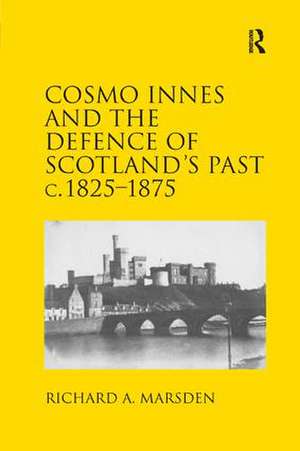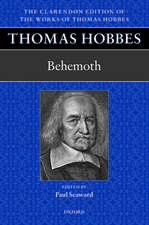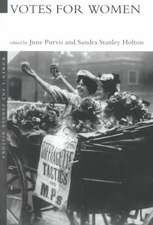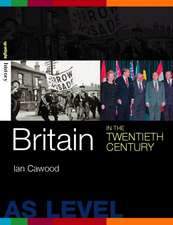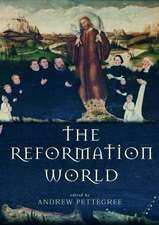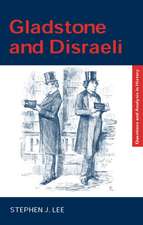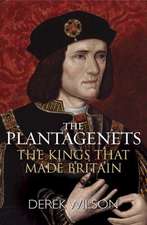Cosmo Innes and the Defence of Scotland's Past c. 1825-1875
Autor Richard A. Marsdenen Limba Engleză Paperback – 7 feb 2017
The activities of the antiquary Cosmo Innes (1798-1874) help us to address this question. Innes was a prolific editor of medieval and early modern documents relating to Scotland's parliament, legal system, burghs, universities, aristocratic families and pre-Reformation church. Yet unlike scholars today, he saw that editorial role in interventionist terms. His source editions were artificial constructs that powerfully articulated his worldview and agendas: emphasising Enlightenment-inspired narratives of social progress and institutional development. At the same time they used manuscript facsimiles and images of medieval architecture to foreground a romantic concern for the texture of past lives.
Innes operated within an elite associational culture which gave him access to the leading intellectuals and politicians of the day. His representations of Scottish history therefore had significant influence and were put to work as commentaries on some of the major debates which exorcised Scotland's intelligentsia across the middle decades of the century.
This analysis of Innes's work with sources, set within the intellectual context of the time and against the antiquarian activities of his contemporaries, provides a window onto the ways in which the 'national past' was perceived in Scotland during the nineteenth century. This allows us to explore how historical thinkers negotiated the apparent dichotomies between Enlightenment and Romanticism, whilst at the same time enabling a re-examination of prevailing assumptions about Scotland's supposed failure to maintain a viable national consciousness in the later 1800s.
| Toate formatele și edițiile | Preț | Express |
|---|---|---|
| Paperback (1) | 469.34 lei 6-8 săpt. | |
| Taylor & Francis – 7 feb 2017 | 469.34 lei 6-8 săpt. | |
| Hardback (1) | 1063.73 lei 6-8 săpt. | |
| Taylor & Francis – 20 aug 2014 | 1063.73 lei 6-8 săpt. |
Preț: 469.34 lei
Nou
Puncte Express: 704
Preț estimativ în valută:
89.82€ • 93.43$ • 74.15£
89.82€ • 93.43$ • 74.15£
Carte tipărită la comandă
Livrare economică 14-28 aprilie
Preluare comenzi: 021 569.72.76
Specificații
ISBN-13: 9781138704695
ISBN-10: 1138704695
Pagini: 384
Dimensiuni: 156 x 234 x 20 mm
Greutate: 0.45 kg
Ediția:1
Editura: Taylor & Francis
Colecția Routledge
Locul publicării:Oxford, United Kingdom
ISBN-10: 1138704695
Pagini: 384
Dimensiuni: 156 x 234 x 20 mm
Greutate: 0.45 kg
Ediția:1
Editura: Taylor & Francis
Colecția Routledge
Locul publicării:Oxford, United Kingdom
Cuprins
Contents: Introduction; Innes’s antiquarianism; The Acts of the Parliaments of Scotland; Burgh sources; Ecclesiastical cartularies; University records; Family papers; manuscript facsimiles; Illustration and photography; Conclusion; Appendix: Innes's periodical contributions; Bibliography; Index.
Notă biografică
Richard A. Marsden is a Lecturer in History at the Open University and an Honorary Research Fellow at Cardiff University, UK
Recenzii
Shortlisted for the Royal Historical Society Whitfield Prize (2014)
Shortlisted for the Saltire Society History Book of the Year Prize (2014)
‘This is a masterly scholarly monograph that fills an important gap in the literature on Cosmo Innes and Scottish antiquarianism and its long afterlife in the nineteenth century. Situating Innes in an older antiquarian tradition, the author is able to convincingly demonstrate the importance of his work with primary sources in making him such an accepted authority on Scottish national history. Marsden’s historiographical discussion of Innes and his contextualisation of him in the wider Scottish, British amd European scenarios are extremely lucid and helpful.’ – Stefan Berger (Ruhr-Universitat Bochum, Germany)
‘Marsden deserves to be read by scholars across the social sciences and humanities, as his work engages with comparative literature (particularly on romanticism), sociology, and political science (especially on civil society and nationalism in Europe) … It is difficult to do justice to such rigorous and nuanced scholarship in a short review’, Journal of Modern History
‘This is a splendid and comprehensive book. For such a substantial work, it is highly readable, illuminating a neglected figure in Scottish historiography, and using Cosmo Innes as a much needed corrective to claims that Scottish history was unwilling or unable to align itself with the demands of Scottish national identity in the mid-nineteenth century.’, Parliaments, Estates and Representation
‘Marsden makes his volume all the more indispensable by revealing how Innes’s life and work complicate some of the broad generalisations that have taken hold regarding Scottish historiographers in the nineteenth century … The book’s introduction (which focuses on the wider field of nineteenth-century Scottish history) should be recommended reading for any student studying modern Scotland.’, British Association for Victorian Studies
‘This text is a valuable addition to the study of nineteenth-century Scottish historiography and adds to our understanding of the character of Scottish national awareness and political nationalism.’, Victorian Periodicals Review
Shortlisted for the Saltire Society History Book of the Year Award 2014
Shortlisted for the Royal Historical Society Whitfield Prize 2014
'For such a substantial work, it is highly readable, illuminating a neglected figure in Scottish historiography, and using Cosmo Innes as a muchneeded corrective to claims that Scottish history was unwilling or unable to align itself with the demands of Scottish national identity in the mid-nineteenth century.' - James Coleman, University of Glasgow, UK, Parliaments, Estates and Representation
'This is a masterly scholarly monograph that fills an important gap in the literature on Cosmo Innes and Scottish antiquarianism and its long afterlife in the nineteenth century. Situating Innes in an older antiquarian tradition, the author is able to convincingly demonstrate the importance of Innes’ work with primary sources in making him such an accepted authority of Scottish national history. Marsden’s historiographical discussion of Innes and his contextualisation of him in the wider Scottish, British and European scenarios are extremely lucid and helpful.’ - Stefan Berger, Ruhr-Universitaet Bochum, Germany
'This text is a valuable addition to the study of nineteenth-century Scottish historiography and adds to our understanding of the character of Scottish national awareness and political nationalism.' - Victorian Periodicals Review
Shortlisted for the Saltire Society History Book of the Year Prize (2014)
‘This is a masterly scholarly monograph that fills an important gap in the literature on Cosmo Innes and Scottish antiquarianism and its long afterlife in the nineteenth century. Situating Innes in an older antiquarian tradition, the author is able to convincingly demonstrate the importance of his work with primary sources in making him such an accepted authority on Scottish national history. Marsden’s historiographical discussion of Innes and his contextualisation of him in the wider Scottish, British amd European scenarios are extremely lucid and helpful.’ – Stefan Berger (Ruhr-Universitat Bochum, Germany)
‘Marsden deserves to be read by scholars across the social sciences and humanities, as his work engages with comparative literature (particularly on romanticism), sociology, and political science (especially on civil society and nationalism in Europe) … It is difficult to do justice to such rigorous and nuanced scholarship in a short review’, Journal of Modern History
‘This is a splendid and comprehensive book. For such a substantial work, it is highly readable, illuminating a neglected figure in Scottish historiography, and using Cosmo Innes as a much needed corrective to claims that Scottish history was unwilling or unable to align itself with the demands of Scottish national identity in the mid-nineteenth century.’, Parliaments, Estates and Representation
‘Marsden makes his volume all the more indispensable by revealing how Innes’s life and work complicate some of the broad generalisations that have taken hold regarding Scottish historiographers in the nineteenth century … The book’s introduction (which focuses on the wider field of nineteenth-century Scottish history) should be recommended reading for any student studying modern Scotland.’, British Association for Victorian Studies
‘This text is a valuable addition to the study of nineteenth-century Scottish historiography and adds to our understanding of the character of Scottish national awareness and political nationalism.’, Victorian Periodicals Review
Shortlisted for the Saltire Society History Book of the Year Award 2014
Shortlisted for the Royal Historical Society Whitfield Prize 2014
'For such a substantial work, it is highly readable, illuminating a neglected figure in Scottish historiography, and using Cosmo Innes as a muchneeded corrective to claims that Scottish history was unwilling or unable to align itself with the demands of Scottish national identity in the mid-nineteenth century.' - James Coleman, University of Glasgow, UK, Parliaments, Estates and Representation
'This is a masterly scholarly monograph that fills an important gap in the literature on Cosmo Innes and Scottish antiquarianism and its long afterlife in the nineteenth century. Situating Innes in an older antiquarian tradition, the author is able to convincingly demonstrate the importance of Innes’ work with primary sources in making him such an accepted authority of Scottish national history. Marsden’s historiographical discussion of Innes and his contextualisation of him in the wider Scottish, British and European scenarios are extremely lucid and helpful.’ - Stefan Berger, Ruhr-Universitaet Bochum, Germany
'This text is a valuable addition to the study of nineteenth-century Scottish historiography and adds to our understanding of the character of Scottish national awareness and political nationalism.' - Victorian Periodicals Review
Descriere
The antiquary Cosmo Innes (1798-1874) was a prolific editor of medieval and early modern documents relating to Scotland's parliament, legal system, burghs, universities, aristocratic families and pre-Reformation church. This book, which analyses Innes's work and provides sources, opens a window onto the ways in which Scottish identity and ideas about the 'national past' were perceived in Scotland during the nineteenth century, a period when union with England was all but unquestioned.
